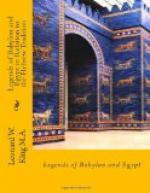In its treatment of the climax of the story we shall see that the Sumerian Version, at any rate in the form it has reached us, is on a lower ethical level than the Babylonian and Hebrew Versions. Ea’s argument that the sinner should bear his own sin and the transgressor his own transgression in some measure forestalls that of Ezekiel;(1) and both the Hebrew Versions represent the saving of Noah as part of the divine intention from the beginning. But the Sumerian Version introduces the element of magic as the means by which man can bend the will of the gods to his own ends. How far the details of the Sumerian myth at this point resembled that of the Gilgamesh Epic it is impossible to say, but the general course of the story must have been the same. In the latter Enlil’s anger is appeased, in the former that of Anu and Enlil; and it is legitimate to suppose that Enki, like Ea, was Ziusudu’s principal supporter, in view of the part he had already taken in ensuring his escape.
(1) Cf. Ezek. xviii, passim, esp. xviii. 20.
VI. THE PROPITIATION OF THE ANGRY GODS, AND ZIUSUDU’S IMMORTALITY
The presence of the puzzling lines, with which the Sixth Column of our text opens, was not explained by Dr. Poebel; indeed, they would be difficult to reconcile with his assumption that our text is an epic pure and simple. But if, as is suggested above, we are dealing with a myth in magical employment, they are quite capable of explanation. The problem these lines present will best be stated by giving a translation of the extant portion of the column, where they will be seen with their immediate context in relation to what follows them:




